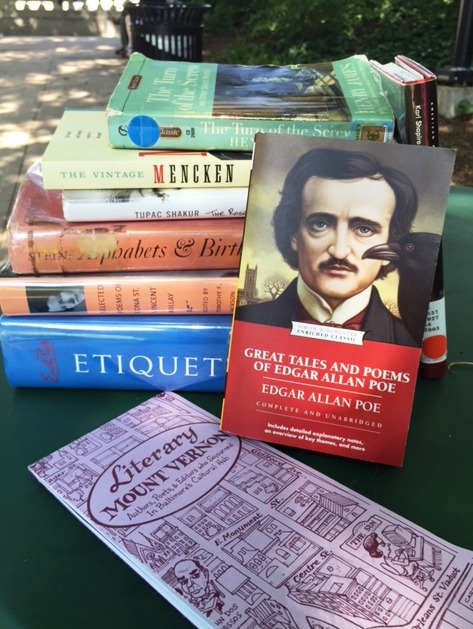
LITERARY WALKING TOUR
Explore sites of interest in Baltimore’s Mount Vernon Cultural District on an upcoming Saturday. Learn more.

Working with local communities, we provide opportunities for partners located across Maryland to collaborate, share resources, build capacity and demonstrate the value of humanities work in their communities.
Encouraging a love of reading and a deeper sense of community, One Maryland One Book is like a statewide book club. Every Marylander is invited to participate through one of the hundreds of events happening around the state.
In a friendly competition, students in grades 6-12 immerse themselves in a facet of history that interests them by researching it in-depth and presenting it in a creative way.
This unique cultural collaboration between the Smithsonian Institution and Maryland Humanities brings high-quality traveling exhibitions to small communities across the state, who make locally focused companion exhibits.
Veterans Book Groups aim to bring veterans of all eras together to talk about military experiences and returning to civilian life while providing an informal, supportive environment for discussion, spurred by the shared reading of literature.
With our network of partners, MCFB develops and supports literary programs that promote and celebrate books, reading, libraries, Maryland writers, and the state’s literary heritage.
Maryland Humanities brings oral history training to schools and communities with Maryland Voices, an oral history project led by Maryland Humanities staff and trained oral historians.

LITERARY WALKING TOUR
Explore sites of interest in Baltimore’s Mount Vernon Cultural District on an upcoming Saturday. Learn more.
“The program gave me new insights and reinforced many of my attitudes and commitments to the care of the seniors whom I see in my clinic. Interacting with colleagues whom I have now had a different and delightful “book club” experience with improves my work performance and work enjoyment.”
“I completed the book club with 22 students, all of them on the JV football team – so not your stereotypical group of book club attendees. On the last day of our book club experience I asked students for some feedback and also asked if they would be interested in participating in another book club. Nearly all of them said that this was the first time they had ever participated in a book club, and a few said it was the first time they had actually read an entire book. I keep hearing back from them, too, [asking] ‘When is the next book club starting up?’. The discussions we had were powerful and meaningful–this was truly one of the most moving experiences I have had as an educator.”
“The project definitely raised the visibility of our organization in western Maryland. Spruce Forest Artisan Village has become a fixture in Garrett County, but it does become taken for granted. This project gave local residents a new reason to make the effort to make a return visit to the Village. Moreover, the programs hosted by the adjacent Penn Alps Restaurant helped us in reaching a new audience.”
“[One Maryland One Book taught me that] these types of book discussions that include diverse populations across the state open necessary dialogues to help solve problems. We need to have many more.”
“[One Maryland One Book] taught me how much we need to talk and listen to one another.”
“The opportunity to host the Smithsonian’s “The Way We Worked” exhibition allowed Sumner Hall to develop meaningful companion exhibits that can remain open to the public in the future. Exhibitions across the county were co-curated by community tradition-bearers, scholars, and college students, empowering citizens of diverse backgrounds to work together to tell their own often-untold stories.”
“One of my students, a boy who works 35 hours a week at McDonalds, took the time to write me a letter stating the book had changed his life.”
“We were very proud to have been chosen to partner with the Maryland Humanities on this exhibit project. Small museums, such as ours…are generally not able to field programs of this scope. Maryland Humanities has truly given us an opportunity to bring a nationally recognized program to the City of Bowie and Prince Georges County and have made it easy to reach and stretch and accomplish something that we’ve never done before on this level in our small museum system. The support of Maryland Humanities both financially and professionally is invaluable to us.”
“Although “Fences” are down, the reverberations of our initiative are still resonating. The web of collaboration is clearly active. Many “reached across the fence.” Our community is all the stronger for it. The exhibition boasts the largest attendance of any seven week display on campus with a visitor count of over 1,050. Add to that the rich programming amounting to over 25 events which saw attendance again well over 1,000 participants. What is remarkable is the cross section of interest groups and individuals who attended from the three-county area of southern Maryland and beyond. In essence, the rich mosaic that formed attracted a broad range of people and opened a rare exchange of ideas. We witnessed epiphanies!”
I’ve loved judging! It’s exciting to see the passion the middle schoolers have put in their projects. I hope that my critiques have helped strive for excellence throughout their lives.